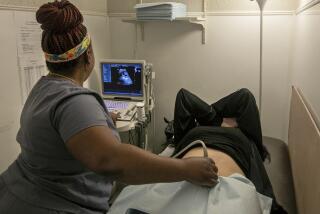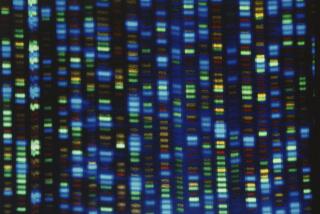The Repercussions of Taking Genetic Control
- Share via
As of now, there are no outside authorities--governmental or otherwise--stepping into decisions on whether, when or how to use PGD (preimplantation genetic diagnosis) technology. Nor are there likely to be any soon.
“Do you really want to start assessing people’s motives for having kids?” says Jeff Kahn, an ethicist at the University of Minnesota, summing up the consensus in the field. “Good luck. We just don’t do that, and we shouldn’t. Try to tell me if having a kid to do work on a farm is a better reason than having one to save the life of a 6-year-old.”
Kahn’s comments reflect an emerging view that there’s nothing inherently unethical about human beings taking control of their genome--what matters is how they use that control. And ethicists and scientists have no trouble identifying reasons to be concerned about embryo screening.
The most obvious reason is the idea of the designer baby, with its echoes of the eugenics movement of early 20th century America and its later adoption by the Nazis.
That baby is still a long way off--scientists have only begun to identify genes that affect such cosmetic traits such as height or skin color, let alone those for intelligence or temperament. But few people in the PGD community doubt that they will. As that menu of selectable traits grows, the complexion of America is sure to change in more ways than one.
“As parents assume responsibility for their child’s genotype, all kinds of notions of guilt and responsibility in households are going to change,” said Leon Kass, bioethicist at the University of Chicago. “You will no longer be able to say to your kid with a big nose, or who can’t dance, or is irascible, ‘Well, it’s just chance.”’
Use Could Take an Emotional Toll
So far, parents and doctors who have used PGD almost universally decry the technology’s use for anything more than attaining full health. But even this use could alter family dynamics.
It’s still not clear, for example, how well children like Molly Nash will assimilate the dual parental sentiments of “We love you” and “We didn’t want to have another child like you.” Molly Nash, 6, had been dying of Fanconi anemia, an inherited blood disease. Her parents, Lisa and Jack Nash of Englewood, Colo., created a sibling bone marrow donor for Molly, using in vitro fertilization. It is unclear how children like her brother, Adam, will cope with the knowledge that they were born, at least in part, to accomplish a utilitarian mission.
What’s more, PGD and related technologies will force a recognition that the line between health and enhancement--between normality and perfection--is surprisingly fuzzy. Childhood vaccinations, almost universally considered to be beneficial, prevent disease by boosting the immune system. Does that mean it’s OK to pre-select embryos that test positive for beefed-up immune-system genes? Or would that cross some ethical line separating Jonas Salk and Dr. Frankenstein?
If immune-system maxi-genes are equivalent to vaccination, does that mean everyone should have the right to PGD for those purposes, just as all parents today have the right to vaccinate their children?
The implications begin to spread like oil. At the center of those implications is a common theme: justice.
“I think the most serious moral worry here is fairness,” said Dan Brock, an ethicist at Brown University. “These things are going to be expensive and not covered by health insurance ... so they’re going to be available preferentially to the socially advantaged.”
Troy Duster, a sociologist at New York University, is not optimistic. He foresees a future steeped in what he calls “eugenics with a small e, not eugenics with a big E”--meaning that the more blatant forms of discrimination of past eugenics movements will give way to more subtle forms, challenging Americans’ concepts of inclusiveness and diversity.
“We have a market economy, so you know the answer,” Duster said. “Of course [PGD] is going to go forward, and the people who can afford these privileges will get them. It’s better to face up to that reality than maintain a fiction that we can have every person at the table.”






